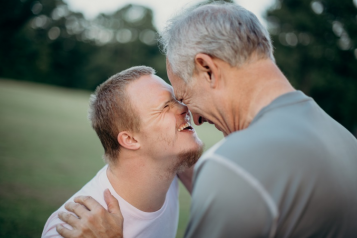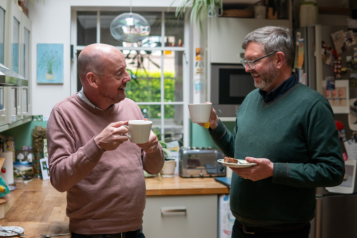Remembering the HIV and AIDS crisis
So, for those who don’t know me, I’m Graham, the Partnership Development Manager here at Healthwatch. I’m also Gay.

Over the last couple of weeks, there’s been an amazing reaction to ‘It’s a Sin’ the Channel 4 mini-series about the 1980s HIV/AIDS crisis written by Russell T Davies.
The drama follows a group of friends in the London gay community over the decade. They start to come to terms with their sexuality, making friends, having fun and hearing about gay men falling ill and dying from an unknown illness.
The story works through their denial that there was such an illness, their response to friends getting sick and dying and the impact of HIV/AIDS on their friendship group.
When I came out in 1993, a lot more was known about the virus, how it is transmitted and how to stay safe. Treatments had been found that would help manage the virus. But there was still a lot of misinformation, fear, stigma and discrimination.
At the time the Government launched campaigns to promote safe sex and there were adverts (commonly known as Tombstones and Icebergs which were featured in the campaign themes) and a leaflet went to every household.
Supporting others
As time went on, I found that HIV was in my friendship group.This made me think about how I was living my life and how I could support others and raise awareness.
So I decided to volunteer for the charity Cambridge AIDS Action, which is now known as Dhiverse.
I trained as a helpline volunteer and took phone calls from people who were concerned that they may have HIV or had been diagnosed.
They wanted to talk about their fears, hopes, find out what support was available, or just talk to someone who wouldn’t be judgemental.
Losing friends
Whilst my career has taken me in many directions, including a stint of working for Dhiverse to promote sexual health throughout Cambridgeshire, the impact of HIV/AIDS in my friendship group has continued.
I have friends who have been diagnosed and I have supported them, giving them the space to talk, ask questions and so on. But most importantly continue to do the things that we have always done.
As a result of HIV/AIDS diagnosis, two of my friends have, sadly, committed suicide. Other friends have died.
Better testing and treatments today
Back in the 80s, it took six weeks to get a test result. Whereas now, some tests at home can can give you results in minutes, although most take about a week.
These days, there are medications that people can take to prevent getting HIV. This medication is known as PrEP – Pre-Exposure Prophylaxis.
People who are diagnosed with HIV have access to very good treatments that keep the virus in check and ensure they can live a long and healthy life.
For people living with HIV, the treatments can make the virus undetectable. This means that they are unable to pass the virus on to anyone.
But while many things have changed for the better, sadly the stigma and discrimination surrounding HIV continues.
Parallels with Covid-19 pandemic
When HIV/AIDS was first discovered, there were people who didn’t believe it existed. There were people who thought ‘I’m healthy, I take care of myself, I’m not in one of the high-risk groups of people’ etc and they didn’t believe that they would become infected.
It is very difficult to become infected with HIV – it can only be transmitted by blood products (blood, semen, vaginal secretions and breast milk) entering the body. It cannot be caught by sitting next to someone, shaking their hands etc.
As we know, Covid-19 can very easily be transmitted.

National HIV Testing Week 1-7 February
It’s quick and easy to get tested for HIV – and lockdown is the perfect time to do it.
It’s really important to get tested if you have unprotected sex or are changing partner. However, research shows that just one in five adults have ever tested for HIV in the UK.
At the moment, the safest way to test is at home. Anyone aged over 16 can order a free home kit – it’s just a finger prick test. Just send the sample back and you will get the result by text.
Lockdown is an ideal time to find out your HIV status.
If you’re HIV positive and you don’t know, you could unintentionally be putting others at risk. The earlier you are diagnosed the better – and the quicker you can start treatment and live well for longer.
Read more
About HIV and AIDS
HIV stands for human immunodeficiency virus. It can affect anyone – regardless of gender, age, sexuality or ethnicity. The virus attacks your body’s immune system, specifically CD4 white blood cells. And means you are less able to fight off infections. It’s transmitted from person to person through bodily fluids (most commonly via unprotected sex). There is currently no cure for it.
AIDS is short for acquired immunodeficiency syndrome and applies to the most advanced stages of HIV infection. It’s defined by the occurrence of any of the more than 20 life-threatening cancers or “opportunistic infections”, so named because they take advantage of a weakened immune system.
Help and Support
Dhiverse is the Cambridgeshire and Peterborough sexual health charity that was originally established in 1986 by a group of friends concerned at the lack of information and support around HIV/AIDS available locally.
It also runs a counselling service is for anyone (including young people) where issues around e.g. sexual health, sexuality, sexual identity, sexual relationships, sexual trauma or HIV are affecting their mental health and wellbeing
01223 508805
Terrence Higgins Trust in Cambridgeshire offers a wide range of support services, including emotional support, help with accessing HIV testing, treatment advice and counselling.
Free, confidential helpline: 0808 802 1221 (Mon-Fri 10am-8pm)
https://www.tht.org.uk/centres-and-services/cambridgeshire
iCaSH (integrated contraception & sexual health) Cambridgeshire runs sexual health clinics offering contraception, treatment for sexually transmitted infections, HIV care and treatment or related advice.
0300 300 3030


